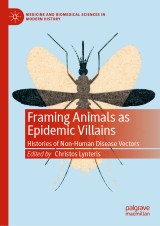Details

Framing Animals as Epidemic Villains
Histories of Non-Human Disease VectorsMedicine and Biomedical Sciences in Modern History
|
CHF 153.50 |
|
| Verlag: | Palgrave Macmillan |
| Format: | |
| Veröffentl.: | 11.10.2019 |
| ISBN/EAN: | 9783030267957 |
| Sprache: | englisch |
Dieses eBook enthält ein Wasserzeichen.
Beschreibungen
<p>This book takes a historical and anthropological approach to understanding how non-human hosts and vectors of diseases are understood, at a time when emerging infectious diseases are one of the central concerns of global health. The volume critically examines the ways in which animals have come to be framed as ‘epidemic villains’ since the turn of the nineteenth century. Providing epistemological and social histories of non-human epidemic blame, as well as ethnographic perspectives on its recent manifestations, the essays explore this cornerstone of modern epidemiology and public health alongside its continuing importance in today’s world. Covering diverse regions, the book argues that framing animals as spreaders and reservoirs of infectious diseases – from plague to rabies to Ebola – is an integral aspect not only to scientific breakthroughs but also to the ideological and biopolitical apparatus of modern medicine. As the first book to consider the impact of the image of non-humandisease hosts and vectors on medicine and public health, it offers a major contribution to our understanding of human-animal interaction under the shadow of global epidemic threat. </p>
<p>Introduction: Infectious Animals and Epidemic Blame, Christos Lynteris.- Chapter 1. Vermin Landscapes: Suffolk, England, Shaped by Plague, Rat and Flea 1906-1920, Karen Sayer.- Chapter 2. Tarbagan’s Winter Lair: Framing Drivers of Plague Persistence in Inner Asia, Christos Lynteris.- Chapter 3. To Kill or not to Kill? Negotiating Life, Death, and One Health in the Context of Dog-Mediated Rabies Control in Colonial and Independent India, Deborah Nadal.- Chapter 4. Tiger Mosquitoes from Ross to Gates, Maurits Meerwijk.- Chapter 5. A Vector in The (Re)Making: A History of Aedes aegypti as Mosquitoes that Transmit Diseases in Brazil, Gabriel Lopes and Luísa Reis-Castro.- Chapter 6. Contesting the (Super)natural Origins of Ebola in Macenta, Guinea: Biomedical and Popular Approaches, Séverine Thys.- Chapter 7. Zika Outbreak in Brazil: In Times of Political and Scientific Uncertainties Mosquitoes Can be Stronger than a Country, Gustavo Corrêa Matta , Lenir Nascimento da Silva, ElaineTeixeira Rabello, and Carolina de Oliveira Nogueira.- 8 Postscript: Epidemic Villains and the Ecologies of Nuisance, Frédéric Keck.</p><p></p>
<p><b>Christos Lynteris </b>is Senior Lecturer in Social Anthropology at the University of St Andrews, UK. A medical anthropologist investigating epistemological, biopolitical, and visual aspects of infectious disease epidemics, he is the author of <i>The Spirit of Selflessness in Maoist China</i> (Palgrave Macmillan, 2012) <i>Ethnographic Plague</i> (Palgrave Macmillan, 2016), and co-author with Lukas Engelmann of <i>Sulphuric Utopias: The History of Maritime Sanitation</i> (forthcoming, 2020).</p>
This book takes a historical and anthropological approach to understanding how non-human hosts and vectors of diseases are understood, at a time when emerging infectious diseases are one of the central concerns of global health. The volume critically examines the ways in which animals have come to be framed as ‘epidemic villains’ since the turn of the nineteenth century. Providing epistemological and social histories of non-human epidemic blame, as well as ethnographic perspectives on its recent manifestations, the essays explore this cornerstone of modern epidemiology and public health alongside its continuing importance in today’s world. Covering diverse regions, the book argues that framing animals as spreaders and reservoirs of infectious diseases – from plague to rabies to Ebola – is an integral aspect not only to scientific breakthroughs but also to the ideological and biopolitical apparatus of modern medicine. As the first book to consider the impact of the image of non-human disease hosts and vectors on medicine and public health, it offers a major contribution to our understanding of human-animal interaction under the shadow of global epidemic threat.
Explores historical perspectives on non-human hosts and vectors of disease, exploring how the framing of animals as ‘epidemic villains’ has shaped medicine and public health Chapters cover a range of human-animal interactions across a number of regions and diseases Shows how our understanding of animals as carriers and causes of disease result from entangled ethical, aesthetic, epistemological and political ideas

















